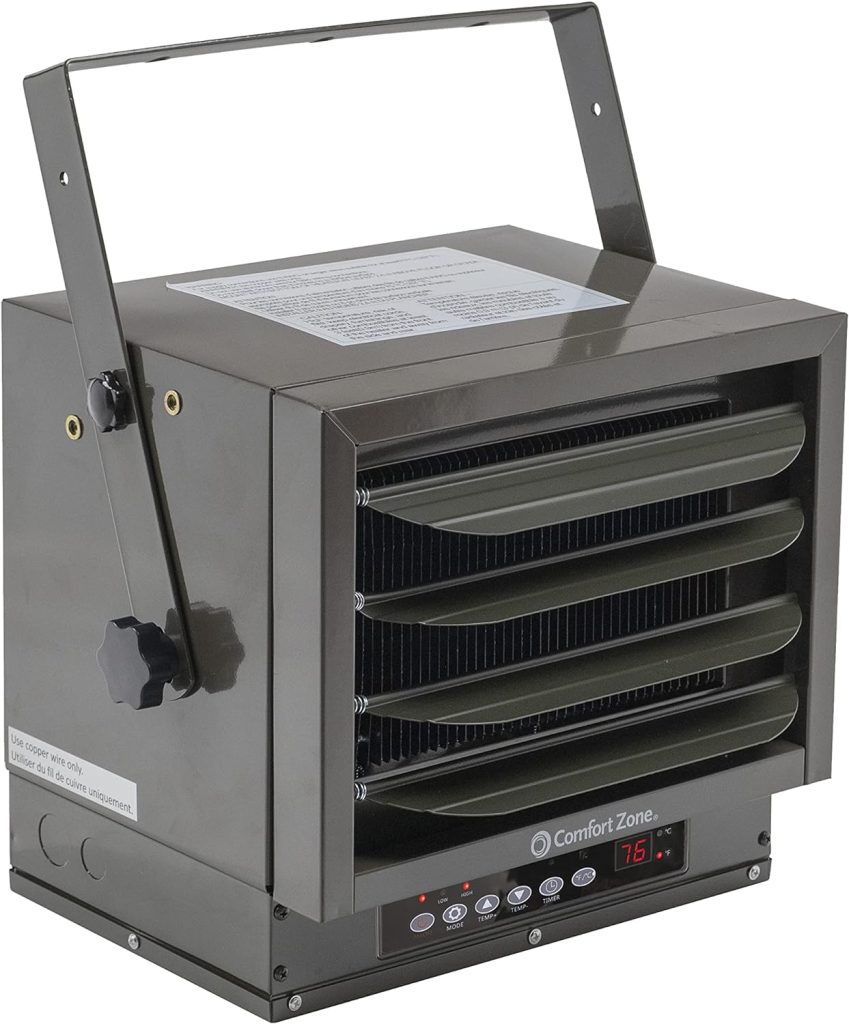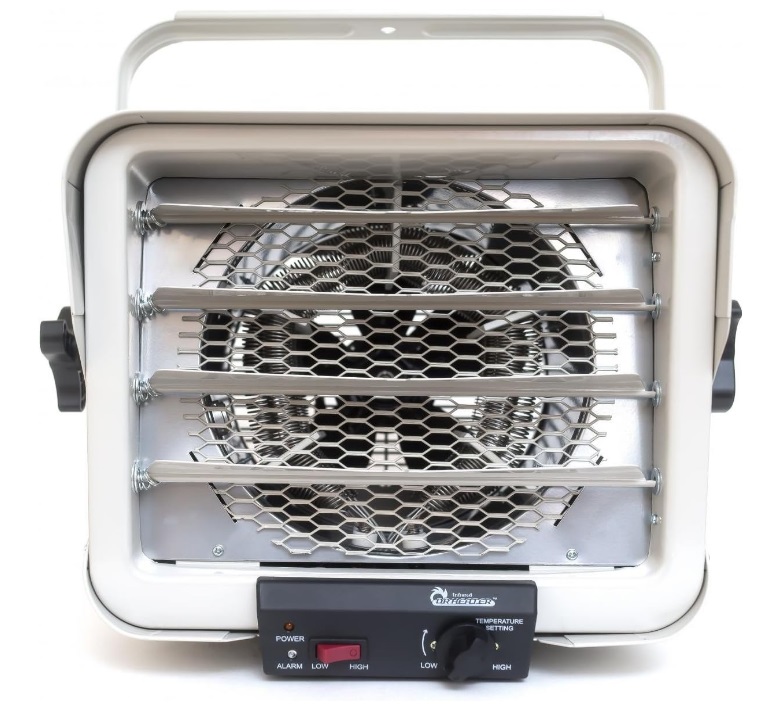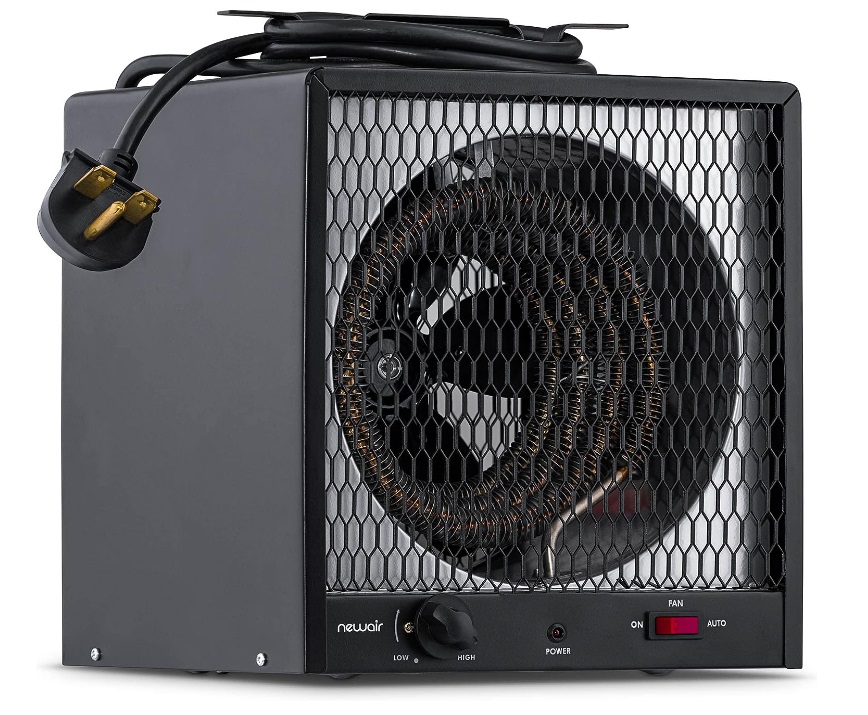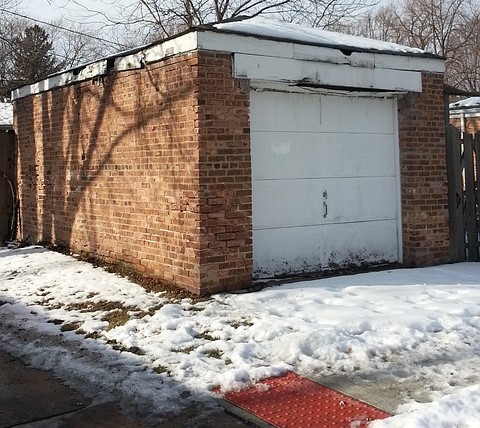Electric Garage Heater: Your Ultimate Guide to Cozy Winters
The garage, for many, is more than just a space to park the car. It’s a workshop, a hangout spot, or even an escape room for some DIY time. Yet, when winter strikes, this beloved space can turn into an icebox. But what if you didn’t have to? This is where electric garage heater come into play, promising warmth even in the chilliest of winters.
What Are Electric Garage Heaters?
Electric garage heaters, as the name suggests, use electricity as their primary source of power to generate heat. It’s a device that’s made to combat the cold in large, often poorly insulated spaces like your garage. They can be either portable or mounted, giving homeowners flexibility in terms of placement and usage. Unlike their gas counterparts, they don’t rely on combustible fuel. Instead, they convert electrical energy into heat, distributing it evenly throughout the area.
Why Choose Electric Over Other Types?
There are various kinds of heaters and choosing can be overwhelming. Gas, propane, kerosene – the list goes on. So why pick electric?
Convenience: No need to refill tanks or fret over fuel levels. With electric heaters, it’s as simple as plugging in and switching on.
Clean Operation: Gas and propane heaters can emit fumes and require proper ventilation. In contrast, electric heaters run clean, ensuring your garage remains fume-free.
Safety: Electric heaters often come with safety features like tip-over switches, thermal cut-offs, and cool-to-touch surfaces. The risk of gas leaks or flare-ups? Non-existent.
Efficiency: Electric heaters convert almost all the energy they consume into heat, ensuring you get the most bang for your buck.
Ease of Installation: While some gas heaters might require professional installation and regular maintenance, most electric garage heaters are DIY-friendly. Whether you’re a rookie or a DIY guru, setting up is usually a breeze.
Key Features to Look For
When it comes to finding the right electric garage heater, you don’t just want any old model. It’s all about compatibility and meeting your needs. Let’s delve into some critical features that you need to consider before making your investment.
Heating Capacity
Imagine wearing a light summer jacket in the midst of a snowstorm; it wouldn’t quite cut it, would it? The same applies to heaters. You need one with the right heating capacity for your garage’s size.
Size Matters: Measure your garage’s square footage. This will help you find a heater powerful enough to warm the entire space. A heater’s capacity is typically measured in British Thermal Units (BTUs) or watts.
Insulation: A well-insulated garage retains heat better. If your garage is poorly insulated, consider a heater with a higher capacity or think about adding insulation to your space.
Temperature Rise: It’s the difference between the desired temperature and the coldest outside temperature. If you live in a region with particularly harsh winters, you’d need a heater with higher BTUs.
Energy Efficiency
We all love a device that provides maximum output while sipping minimal energy.
Look for Energy Star Ratings: A higher rating usually means better efficiency.
Adjustable Thermostats: These allow you to set your desired temperature, ensuring the heater doesn’t overwork.
Programmable Timers: These let you decide when the heater operates, saving energy when you’re not using the garage.
Safety Features
Safety isn’t just a feature; it’s a necessity. It’s about ensuring risks are minimized.
Overheat Protection: This feature automatically shuts down the heater if internal components reach unsafe temperatures.
Tip-over Switch: Especially important for portable heaters, this feature turns off the unit if it gets knocked over. Think of it as a reflex; it reacts before you even know there’s a potential hazard.
Cool-to-Touch Exterior: A heater that remains cool on the outside can prevent accidental burns.
Ground Fault Circuit Interrupter (GFCI) Plug: This is a must-have for electric heaters in damp spaces. The GFCI plug prevents electrical shocks by quickly cutting off power if a fault is detected.
Top Recommendations
Comfort Zone CZ230ER 7,500-Watt, 240v Hard-Wired Digital Fan-Forced Ceiling Mount Heater

The Comfort Zone CZ230ER ceiling-mounted, fan-forced heater is designed for optimal space utilization, ideal for environments like warehouses and garages. It efficiently heats up to 1250 sq. ft., maximizing floor space while offering widespread warmth. Constructed with heavy gauge steel, it withstands temperature fluctuations in poorly insulated areas, ensuring durability and longevity. The heater features adjustable louvers and a variable mounting angle for precise airflow control, enhancing its heating effectiveness. User-friendly, it includes a digital thermostat and remote control for easy temperature adjustments. Additionally, it is equipped with safety features like an automatic shut-off sensor and a power indicator light, ensuring safe operation.
Dr. Heater DR966 240-volt Hardwired Shop Garage Commercial Heater

This robust 240V single-phase commercial electric heater offers two power modes: a high power mode with a maximum output of 6000W and a low power mode at 3000W, effectively heating up to 600 sq ft. Dr. Heater DR966 is designed for hardwiring (power cord not included), it recommends using 8 AWG copper wires for connection. The unit measures 14.5″ in height, width, and depth. UL/CUL listed, it can be mounted on the wall or ceiling and includes a mounting bracket. The heater features an adjustable thermostat with high and low settings and a dynamic 8-inch fan for efficient air circulation with minimal noise. Additionally, it has 5 adjustable louvers to direct airflow as needed.
NewAir Portable Heater (240V) Portable Electric Garage Heater

This NewAir Portable electric garage heater offers 5,600 watts of power, efficiently warming areas up to 600 square feet, ideal for two-car garages or workshops. Its rugged black powder-coated steel body is designed to withstand scratches and scuffs, suitable for garages and light industrial environments. The heater includes a thermostat and an auto-fan for temperature control, maintaining the desired warmth. Portability is enhanced with a cord wrap and carry handle, facilitating easy movement. For safety, it features an automatic shut-off to prevent overheating and a cool-to-touch exterior after use, ensuring a safe working environment.
Top Benefits of Using an Electric Garage Heater
Ah, the electric garage heater – more than just a device, it’s a passport to warmth and comfort, especially during those bone-chilling months. Beyond just beating the cold, have you ever wondered what other boons this piece of tech brings? Let’s break it down.
Environmentally Friendly
Your electric garage heater can help you reduce your carbon footprint.
Zero Emissions: Unlike fossil fuel-based heaters, electric units don’t emit carbon monoxide or other harmful gasses.
Efficient Energy Use: Modern electric garage heaters convert almost all the electricity they consume into heat. Think of it as getting the most juice out of your orange.
Renewable Energy Compatibility: As our power grids increasingly rely on renewable energy sources like wind and solar, using an electric heater becomes an environmentally conscious choice. It’s like tapping into nature’s bounty to keep warm.
Cost-Effective Heating
For many, the thought of added utility bills is discouraging. However, electric garage heaters can be gentle on the pocket in the long run.
Lower Initial Investment: Unlike some heating solutions, many electric models are affordably priced without compromising on quality.
Reduced Maintenance Costs: Without burners, fuel lines, or tanks to worry about, the maintenance costs for electric heaters are often lower than other types.
Efficient Operation: With adjustable thermostats and customizable settings, you’re only using energy when you need it, ensuring your bills stay in check.
Space-Saving Designs
If you’ve ever struggled with the puzzle of optimizing garage space, you’ll appreciate this benefit.
Compact Builds: Many electric garage heaters are designed with compactness in mind. They’re sleek, modern gadgets that are useful without hogging space.
Wall and Ceiling Mounts: Some models can be mounted on walls or ceilings, freeing up floor space.
Portability: Many units come with handles or wheels, allowing you to move them where heat is most needed. It’s like having a mobile source of warmth that follows you around.

Setting Up Your Electric Garage Heater
Once you’ve chosen your electric garage heater, the next steps involve ensuring it’s properly set up. Correct installation and maintenance not only optimize heating performance but also extend the lifespan of your device. It’s like giving your heater a solid foundation to operate from, ensuring it serves you efficiently for years to come.
Positioning and Installation
Positioning your heater correctly can significantly impact its efficiency.
1. Spot Selection: Identify a spot that allows for even distribution of heat. Avoid placing the heater directly on the floor unless it’s designed for it. Elevation, like wall or ceiling mounts, can often help distribute heat more effectively.
2. Clearance: Ensure there’s ample space around the heater. Keeping it too close to walls or objects could restrict airflow and reduce efficiency. Think of it like giving it room to breathe.
3. Direction: Aim the heater towards the center of the garage or towards areas that need the most heat. Just like you’d direct a fan to where you need a breeze.
4. Electrical Requirements: Check the voltage and circuit requirements of the heater. Some powerful units might need a dedicated circuit. If unsure, it’s always a good idea to consult an electrician. Remember, it’s about ensuring the heater and your home’s electrical system are in harmony.
5. Wall or Ceiling Mount: If your heater is designed to be mounted, make sure it’s securely fastened. It’s crucial, especially in active spaces like garages where there’s a lot of movement. Think of it as securing a picture frame on a wall – you wouldn’t want it falling off, would you?
Maintenance Tips
A well-maintained heater is like a well-oiled machine; it operates smoothly and lasts longer.
1. Regular Cleaning: Dust and debris can reduce efficiency and pose a fire risk. A simple routine of wiping down the exterior and vacuuming air intakes can make a world of difference.
2. Check Electrical Connections: Over time, vibrations or wear and tear might loosen connections. Periodically ensure all plugs and switches are securely connected.
3. Inspect Heating Elements: For radiant heaters, it’s a good practice to check the heating elements for any signs of wear or damage.
4. Replace Filters: If your heater has filters, remember to clean or replace them as per the manufacturer’s recommendations.
5. Avoid Overloading the Circuit: Don’t plug in too many devices with the heater on the same circuit. It can reduce efficiency and pose a safety risk.
6. Keep the Area Clear: Ensure that the space around your heater remains free from flammable materials. Just as you wouldn’t light a candle near curtains, maintain safe distances with heaters too.
Common Misconceptions
Misconceptions are also common with electric garage heaters leading to confusion or even misguided decisions. Let’s debunk a couple of the common myths surrounding them.
“They’re Too Expensive”
This is akin to the age-old belief that “eating healthy is too costly.” Just like there are affordable healthy food options, there are cost-effective electric garage heaters.
Initial Cost vs. Long-Term Benefits: While some high-end models might be pricier, there are plenty of efficient units that won’t break the bank. Plus, consider the long-term energy savings and the convenience of a warm garage.
Operational Costs: Electric heaters convert nearly all their energy into heat, which is efficient. Moreover, with the rising efficiency of electric grids and the move towards renewable sources, the cost of electricity might even become more competitive in some areas.
Maintenance Costs: Compared to gas or propane heaters, electric models often have fewer moving parts and don’t require fuel refills, potentially reducing long-term expenses.
“They Don’t Heat Well”
Saying an electric garage heater doesn’t heat well is like saying all cars are slow based on one dated model.
Heating Capacity: As discussed earlier, it’s crucial to choose a heater with the appropriate BTU or wattage for your space. A heater designed for a small room won’t be effective in a large garage and vice versa.
Insulation Matters: Sometimes, the issue isn’t the heater but the garage’s insulation. Even the most powerful heater would struggle in a space where heat escapes rapidly.
Efficiency: Modern electric garage heaters are designed for efficiency. With features like adjustable thermostats and programmable timers, they can maintain a consistent and comfortable temperature.
Uniform Heating: Electric heaters can distribute heat evenly, ensuring no cold spots. Features like oscillating fans or reflectors help in maximizing heat distribution.

Conclusion
The electric garage heater, when understood and chosen wisely, stands as an invaluable tool for homeowners worldwide. By understanding the needs of your garage, debunking misconceptions, and focusing on efficient setup and maintenance, you can enjoy consistent warmth all year round.
FAQs
1. How much does it cost to run an electric garage heater?
The cost varies based on the heater’s wattage and local electricity rates. You can calculate it by multiplying the heater’s wattage by the number of hours used and then multiplying by your electricity rate.
2. Can I install an electric garage heater by myself?
While many electric garage heaters are designed for easy installation, if you’re unsure or if the model requires hardwiring, it’s always best to consult with or hire a professional electrician.
3. Is it safe to leave my electric garage heater on overnight?
Most modern electric heaters have safety features that make them safe for extended use. However, for peace of mind, it’s advisable to turn them off when not in use or invest in a model with a timer.
4. Do electric garage heaters need a lot of maintenance?
Generally, electric heaters require less maintenance than their gas counterparts. Regular cleaning and occasional checks on electrical connections should suffice for most models.
5. Will an electric garage heater increase my electricity bill significantly?
While there might be an increase in your bill, using the heater efficiently, selecting a model with energy-saving features, and ensuring your garage is well-insulated can help mitigate the costs. Think of it as a trade-off for comfort and convenience.




